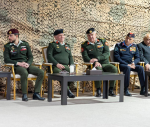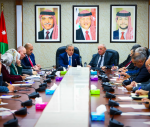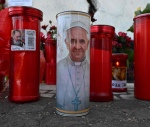You are here
US divided over what to do about Iran nuclear deal
Jun 07,2023 - Last updated at Jun 07,2023
Pieces of the puzzle portraying Iranian, British, French, German, Chinese and Russian negotiators meeting with the European Union mediator who deals with the US team began to form a picture last month with the aim of renewing the 2015 agreement limiting Iran's nuclear programme in exchange for lifting sanctions.
Talks were suspended last August when Iran sought amendments to a proposed text of the agreement which would bring both the US and Iran into compliance. Donald Trump withdrew from the agreement in 2018 and imposed a "maximum pressure" campaign of punitive sanctions on Iran. Tehran waited in vain for a year for the European governments involved to take action or, at least, violate some of the sanctions. When this did not happen, Iran gradually breached limits set by the deal. Iran enriched uranium to 20 and 60 per cent, far above 3.67 per cent purity allowed, amassed a stockpile 23 times the amount agreed, deployed advanced centrifuges, reined in International Atomic Energy Agency (IAEA) inspectors and shut down IAEA cameras monitoring Iran's nuclear facilities.
The Financial Times reported on June 2 that there had been contacts with Iranian officials in recent months. ”There was a meeting in Oslo in March between officials from France, Germany and the UK and Ali Bagheri Kani, Iran’s nuclear negotiator. And, US envoy Robert Malley “has met several times with Iran’s UN ambassador Amir Saeid Iravani, who was a senior official at the Supreme National Security Council before being posted to New York in September”.
On May 4, Iranian academic Mohammed Mirandi, who advises Iran's negotiators, was quoted by Al Mayadeen television as saying that Tehran is ready to accept the text presented last year by EU Foreign Policy chief Josep Borrell. Iran did not reject the text but called for guarantees over US compliance. Iran has serious reasons to mistrust the US. The Obama administration did not lift secondary sanctions when the agreement was implemented in January 2016 and threatened foreign governments, firms and individuals with sanctions if they invested or did business in Iran. In 2021, after Trump left office, his successor Joe Biden did not re-enter the agreement but put conditions on reentry not connected with the deal. Iran rejected these conditions.
On May 8, Biden's senior regional adviser Brett McGurk went to Muscat to ask Oman to mediate between Iran and the US. On May 28th-29th, during a visit to Tehran Oman's ruler Sultan Haitham bin Tariq Al Said discussed this and other issues with President Ebrahim Raisi and Supreme Leader Ayatollah Ali Khamenei.
Oman has performed as a mediator between Iran and Western countries and Iran and Arab countries. Along with Baghdad, Muscat played a key role in talks which culminated in the March 10th Chinese-proclaimed restoration of relations between Iran and Saudi Arabia. This initiated a process of wider regional reconciliation.
On May 30, Malley told US National Public Radio that the US prefers the "diplomatic option" rather than military means to prevent Iran from obtaining nuclear weapons. He admitted that US intelligence agencies do not believe that Iran is pursuing such weapons, contrary to accusations by Israel and anti-Iranian Western politicians and media. Malley also said that if Iran seeks to return to the deal "we're prepared to do it”. He stated, "Our goal is to reach a diplomatic outcome with Iran that would verifiably ensure that Iran can't acquire a nuclear weapon. We're not there yet of course." When Trump pulled out, Iran was scrupulously adhering to the terms of the deal but the US never met its commitment to lift secondary sanctions. Nevertheless, Tehran persisted, and the Iranian economy had a brief spurt of growth before Trump torpedoed the deal.
Malley's interview coincided with two other developments. First, it was revealed that the US and South Korea were discussing the release of $7 billion in blocked Iranian funds in South Korean banks. Iran has long demanded this sum which is sorely needed as Iran is facing major economic melt-down as well as popular protests and Western criticism for providing Russia with drones during its war with Ukraine. About $100 billion in Iranian funds, of which $10 billion are in the US, have been frozen in foreign banks thanks to sanctions. Iraq has already reached an agreement with Iran to unfreeze $10 billion in Iraqi banks.
Second, IAEA announced that Iran has provided information on traces of enriched uranium at one of three sites abandoned when Iran halted weapons research in 2003 and closed the file on uranium accidentally enriched to 84 per cent during purification to 60 per cent. Iran has also permitted the IAEA to resume some monitoring with cameras which had been turned off. Although work has to be completed before the IAEA's tasks are completed, IAEA director Rafael Grossi told CNN that there has been "progress" in resolving issues with the agency.
Tehran has said it would revert to the terms of the deal if the US reenters, but Iran is not prepared to implement it obligations until the US begins to lift key sanctions on oil exports, banking, investment, and essential trade and business. These are the measures which have beggared Iran's economy.
McGurk’s trip to Oman, the sultan’s visit to Tehran, Malley’s comments, talks over the release of $7 billion of Iranian funds, progress on IAEA issues suggested that the US was on board for the revival of talks and conclusion of a deal. However, on May 31, National Security spokesman John Kirby said re-entering the agreement is not a priority for the Biden administration. He accused Iran of not negotiating in “good faith” and said that “domestic strife” in Iran and its support of Russia in the Ukraine war were reasons why the administration was not focusing on this issue.
However, it appears the US which never showed “good faith” in implementing the nuclear deal, is itself divided over what to do about it. Diplomats involved in May’s developments may have been sabotaged by security types who want to maintain the status quo due to Israel and its US surrogates who prefer the military option.
Iran expert Ali Vaez told The Financial Times that European governments wait for the Biden administration to make “a decision, but they are frustrated because the US just wants to put a lid on this until after the 2024 elections. The primary concern here is the president’s reelection”.













